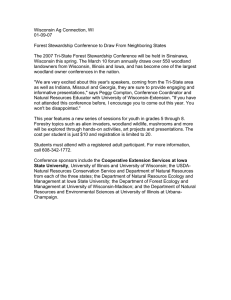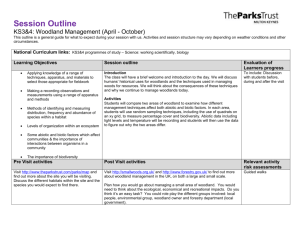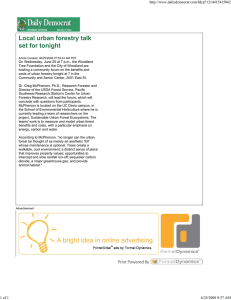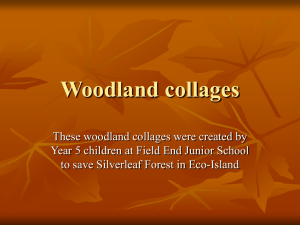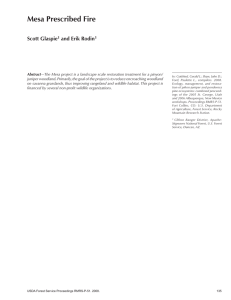Annual Report for Fiscal Year 2004
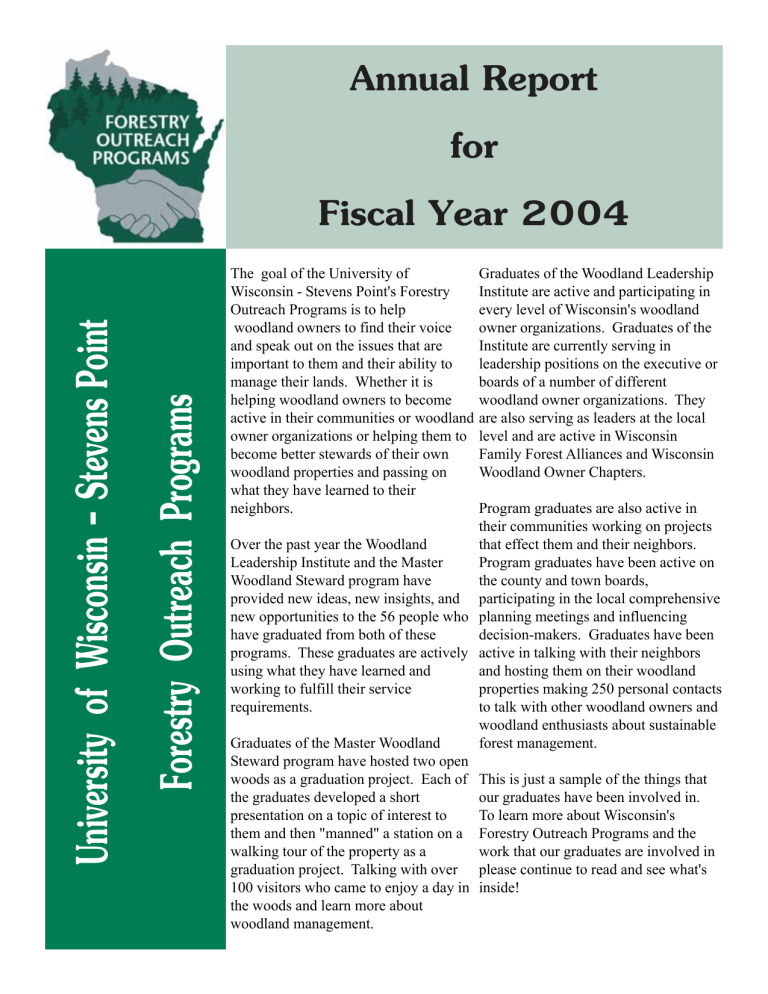
Annual Report for
Fiscal Year 2004
The goal of the University of
Wisconsin - Stevens Point's Forestry
Outreach Programs is to help
woodland owners to find their voice and speak out on the issues that are important to them and their ability to manage their lands. Whether it is helping woodland owners to become active in their communities or woodland owner organizations or helping them to become better stewards of their own woodland properties and passing on what they have learned to their neighbors.
Graduates of the Woodland Leadership
Institute are active and participating in every level of Wisconsin's woodland owner organizations. Graduates of the
Institute are currently serving in leadership positions on the executive or boards of a number of different woodland owner organizations. They are also serving as leaders at the local level and are active in Wisconsin
Family Forest Alliances and Wisconsin
Woodland Owner Chapters.
Over the past year the Woodland
Leadership Institute and the Master
Woodland Steward program have provided new ideas, new insights, and new opportunities to the 56 people who have graduated from both of these programs. These graduates are actively using what they have learned and working to fulfill their service requirements.
Program graduates are also active in their communities working on projects that effect them and their neighbors.
Program graduates have been active on the county and town boards, participating in the local comprehensive planning meetings and influencing decision-makers. Graduates have been active in talking with their neighbors and hosting them on their woodland properties making 250 personal contacts to talk with other woodland owners and woodland enthusiasts about sustainable forest management.
Graduates of the Master Woodland
Steward program have hosted two open woods as a graduation project. Each of the graduates developed a short presentation on a topic of interest to them and then "manned" a station on a walking tour of the property as a graduation project. Talking with over
100 visitors who came to enjoy a day in the woods and learn more about woodland management.
This is just a sample of the things that our graduates have been involved in.
To learn more about Wisconsin's
Forestry Outreach Programs and the work that our graduates are involved in please continue to read and see what's inside!
education to build their skills and help to prepare them as they look for opportunities to serve.
The Woodland Leadership Institute prepares graduates to play an active role as leaders in Wisconsin's woodland owner organizations and their local community on issues related to public policy, stewardship of private woodlands, and sustainable forest management.
The Woodland Leadership Institute continues to grow and impact forestry in
Wisconsin. 25 men and women from throughout the state successfully completed the program in 2003. Each of them with a plan in place for how they hope to use what they learned through their participation in the Institute.
To meet this goals the Forestry Outreach
Programs working with Wisconsin
Woodland Owners Association held its first Organization Management
Workshop. This program was specifically designed for graduates of the
WLI who have taken leadership positions within one of Wisconsin's woodland owner organizations. However, this program was open to anyone who has recently been elected to serve in a position of leadership in a woodland owner organization. The purpose of the workshop was to help those who have just been elected or volunteered to understand their role and provide them with skills and techniques to help them fulfill their responsibilities. Some of the topics that were covered included understanding the rules that govern your organization, learning how to manage a meeting, learning how to build effective teams, strategic planning skills, ideas to promote and sustain your organization, and learning how to understand the
Treasurer's report.
The Institute is designed to help participants seek out opportunities for service. Participants work to learn more about their community and the issues woodland owners face through the seminars, readings, observations and interviews of community leaders, and the sharing of ideas and feedback from their classmates. The increased emphasis on group work and allowing the participants time to share what they have learned through the readings and homework assignments has become the most popular part of the Institute. The peer to peer sharing of their experiences as each of them works their way through the curriculum is helping them to build relationships that have lasted beyond the
Institute.
Another goal of the Institute is to connect graduates from each class to give them an opportunity to learn about what each other are doing in their community. The
Woodland Leadership Institute held its first class reunion in March of this year.
The reunion was an opportunity for the graduates to learn more about issues important to Wisconsin's woodland owners and to share what they have learned. The focus of the program was a series of updates on the Managed Forest
Law, Forest Certification, and the
Comprehensive Planning Law. The emphasis of the program was on building networks within their communities to address issues that impact them and their neighbors.
Three classes have graduated from the
Institute since it first started in 2001. One of the goals of the program is to provide graduates with opportunities for continuing
The Institute is currently soliciting applications for the Class of 2004 and will hold its first seminar in October.
Thoughts from our graduates
"The best person to learn fishing from is from someone who would rather be out fishing than talking to someone about fishing.
Why? Because they have no need to brag or impress others. Their goal in
"talking fishing" is to share their joy of fishing with others who have a common interest. That's the type of foresters who teach this course. Their first love is being out in the forest. So their goal in "talking forestry" is to share their love of forestry with you.
To them you are a teammate, someone who shares a common interest and passion. Someone to work with them in promoting forestry at all levels."
"If you have any passion about being a woodland steward, if you have any interest in learning more about forestry, or if you want to see how you can use your own power to help change the world in a positive way - check this out!"
"The Leadership Institute was a fantastic opportunity to learn as we shared ideas; to "think outside the box" and form a network of friendships for information and support!"
Community Impacts
Sue Brisk, WDNR,
Place Artwork Here
Enjoying the
P h o t o g r a p h b y
Jo h n D u P l i s s i s, U W S P
grounds at Trees for Tomorrow as the class work through a public talks with the class about forest management on the Northern
Highlands -
Graduates of the Class of 2002 have put in almost 950 hours of volunteer work reaching out to their neighbors and other woodland owners. They have spoken to over 200 woodland owners on a one-toone basis and made presentations to over
400 people attending workshops or field days.
American Legion
State Forest
Place Artwork Here
Percent of graduates actively engaged in outreach activities to neighbors and peers:
Talking one-on-one with at least one other woodland owner about the benefits of good forest management (83 percent).
Assisting neighbors with obtaining management assistance (83 percent).
Showing other landowners your management activities (67 percent).
Maintaining active involvement with a local woodland owners association
(67 percent).
Using ideas learned from the Institute on your land (50 percent).
Taking the lead to address forestry issues important to your community
(33 percent).
policy exercise
P h o t o g r a p h b y
Jo h n D u P l i s s i s, U W S P
Graduates have also been actively involved in outreach to local government officials:
Graduates have attended 51 local government hearings or board meetings.
Place Artwork Here
P h o t o g r a p h b y
Jo h n D u P l i s s i s, U W S P
Gus Erdmann,
U.S.F.S. retired, talks with the class about research and
Percent of graduates who have contacted local government officials
State legislative representative
(67 percent).
County Board member (33 percent).
Town Board member (33 percent).
Planning commission member
(17 percent).
Conservation commission member
(17 percent).
the science of forestry on the
Argonne
Experimental forest
Graduates have also been actively engaged in playing leadership role in the representation and development of woodland owner organizations.
Jim Heerey was appointed to the
Governor's Council on Forestry. Gerry
Mich is currently the Executive Director of Wisconsin Family Forests.
The second was having the students to host a field day as a graduation project.
The purpose for the graduation project is to help Program graduates become comfortable sharing what they have learned. Each participant hosted a
"learning station" as a part of the program and made short presentations to the people who visited. Close to 100 people attended both the field day held at the
Seno Woodland Education Center and the
WWOA's Open Woods held at the Paul
Lochner property in Portage County.
The Master Woodland Steward Program is designed to take advantage of peer-to-peer networks that forest landowners develop in their community and through involvement in woodland owner organizations. By providing information and education on sustainable forest management practices we hope to achieve a multiplier effect as
Program graduates practice what they have learned on their own lands and work in their communities to promote sustainable forest management.
Graduates are applying what they have learned on their properties and working in their communities and woodland owner organizations to help their neighbors seek professional assistance in the management of the woodlands. 100 percent of the graduates have talked with at least one of their neighbors about forest management and 84 percent are actively using what they learned and using their lands to demonstrate sustainable forest management techniques to other woodland owners.
The Master Woodland Steward Program continues to grow and impact the management of private nonindustrial forest lands in Wisconsin. 31 woodland owners, owning or managing nearly 6,200 acres of woodlands, successfully completed the program last year and are currently working to promote sustainable forest management in their communities and woodland owner organizations.
Two sessions of the Master Woodland
Steward (MWS) program were offered in
FY 2004. The first class was held in partnership with the Seno Woodland
Education Center in Burlington Wisconsin.
The other was held at the Schmeeckle
Reserve on the campus of UW - Stevens
Point.
Program graduates have also been actively developing relationships with natural resource management professionals. 84 percent have developed a relationship with their DNR district forester since graduating from the program. 50 percent of graduates have sought assistance from consultants, and
34 percent of graduates have sought assistance from federal and state wildlife management programs. It is also important to note the 67 percent of graduates have developed a relationship or reconnected with a woodland owner organization in their area.
There were several changes that were implemented as a part of the program for
FY 2004. First, based on participant evaluations and recommendations from the
Curriculum Committee the Program now includes a series of readings and homework assignments. These were established to help participants to think about how they can use what they learn and to prepare for the next seminar.
Program graduates are actively involved in their communities and woodland owner organizations. They are using what they have learned on their own lands and are active and passionate voices in their communities to promote sustainable forest management.
Woodland
Management Guide
The Woodland Management
Guide is the web based companion to the Master
Woodland Steward Program.
The information that is provided here is designed to enrich the learning experience of woodland owners and enthusiasts who are enrolled in this Program.
The material presented on this website is drawn from many different sources. The main source is the Wisconsin
Department of Natural
Resources's Forest
Management Guidelines. The goal of this website is to place this information into context with the curriculum of the
Master Woodland Steward
Program and provide a better understanding of sustainable forest management.
While this website is designed to enhance the curriculum of the Master
Woodland Steward Program and enrich the learning experience of program participants, the information provided should be of benefit to any woodland owner or woodland enthusiast and should help to promote the program and develop an interest among viewers to participate in future Program offerings. You can find the
Woodland Management
Guide on the Web at: http://www.uwsp.edu/cnr/ woodlandmg/
P h o t o g r a p h b y
Jo h n D u P l i s s i s, U W S P
Program Evaluation
John Shippy shows a group plans for building wood duck houses as a part of
WWOA Open
Woods
Participant Characteristics
When participants were asked about their primary interests and/or management objectives for their woodlands they listed
"recreation" most frequently followed by
"Woodland management" and "improve wildlife habitat." When asked about their plans for their woodland property over the next five years participants listed "buying more woodland" and conducting "minimum activity to maintain their woodlands" (33 percent), "tree planting," "written management plan," and "habitat improvement" (27 percent) and "collecting non-timber forest products" (12 percent).
John Taylor explains why leaves change color in the fall at the Seno
Woodland
Education Center
P h o t o g r a p h b y
Jo h n D u P l i s s i s, U W S P
Place Artwork Here
P h o t o g r a p h b y
Jo h n D u P l i s s i s, U W S P
Overall Enjoyment
Participants felt that the MWS program met or exceeded their expectations. 60 percent of participants indicated that they enjoyed all subjects in the program equally.
Forest ecology and wildlife management were frequent responses and these results are consistent with responses to the precourse questionnaires where participants expressed interests in forest aesthetics, ecology and wildlife management.
Woodland Management Preparation
Program participants indicated that information on "silviculture" provided them with the preparation for work on their woodlands. Many also felt that the seminars on "forest aesthetics, recreation, and other non-timber issues" would also help them manage their woodlands.
Marsha Kray talks to woodland owners about soil
Knowledge Level
Program participants felt that they had gained "sufficient skill to implement management activities." The median knowledge level of program participants jumped from a 2, on a scale of 1 to 5, prior to participating in the program to a 4.
properties at the
Seno Woodland
Education Center
Recommendations from Graduates
Graduates noted that tree identification and invasive species management should have been covered more extensively in the program. Participants also felt that soil and stand condition evaluation information would have improved the program.
The Forestry Outreach Program at UW - Stevens Point is a partnership of the University of Wisconsin Stevens Point,
University of Wisconsin Extension, Wisconsin Department of
Natural Resources and Wisconsin's Woodland Owner
Organizations. The Forestry Outreach Program owes a debt of gratitude to the members of its Advisory and Curriculum committees for their efforts to assist the Program Director in the development and implementation of these programs and the continuing effort to improve the content of these programs. The
Woodland Leadership Institute
Advisory Committee
Al Anderson
UW Extension
Shirley Bargander
Wisconsin DNR
Nancy Bozek
Wisconsin Woodland Owner Association
Evelyn Charlson
WLI Graduate
Alan Haney
UW Stevens Point
Gerry Mich
Wisconsin Family Forests, inc.
Carl Mueller
Wisconsin Woodland Owner Association
Paul Pingrey
Wisconsin DNR
Geary Searfoss
Wisconsin Forest Productivity Council
Curriculum Committee
Al Anderson
UW Extension
Paul Pingrey
Wisconsin DNR
Mark Rickenbach
UW - Madison
Master Woodland Steward
Advisory Committee
Glen Charlson
Wisconsin Woodland Owners Association
Genny Fannucchi
Wisconsin DNR
Mike Gehrke
MWS Graduate
Alan Haney
UW Stevens Point
James Heerey
MWS Graduate
Ron Jones
Wisconsin DNR
Dan Kretz
Kretz Lumber
Curriculum Committee
Scott Craven
UW - Madison
Bill Klase
UW Extension
Jamie Nack
UW - Madison
Mark Rickenbach
UW - Madison
Geary Searfoss
Wisconsin Forest Productivity Council
The Forestry Outreach Programs rely on experts from a variety of disciplines to act as resources and provide presentations and readings for students. Our collaborators in these efforts include:
Aldo Leopold Foundation
Buddy Huffaker
Geneva Lake Conservancy
Chris Goebel
Javorek Logging
Steve Javorek
Kretz Lumber Company, Inc.
Al Koeppel
Lakeshore Forest Products, Inc.
Jim Bednar
Sauk County Land Conservation Department
Joe Van Berkel
State of Wisconsin
Representative Don Friske
Steve Gress Forestry Services
Steve Gress
Stora Enso North America
Todd Krause
Fred Souba
Tim Tollefson
U.S. Forest Service
Gus Erdmann (retired)
Lori Tippin
University of Wisconsin - Extension
Al Anderson
Matt Davis
Matt Duvall
Ken Genskow
Mark Hilliker
Bill Klase
University of Wisconsin – Madison
Scott Craven
Jamie Nack
Mark Rickenbach
University of Wisconsin - Stevens Point
John DuPlissis
Richard Geesey
Stan Gruszynski
William Love
Lynn Markham
Victor Phillips
Bobbie Webster
Wagner Woods and Wildlife
Pete Wagner
Wisconsin Academy of Sciences, Arts and Letters
Curt Meine
Wisconsin County Forests Association
Colette Matthews
Wisconsin Department of Natural Resources
Jeff Barkley
Sue Brisk
Paul DeLong
Mike Luedeke
Paul Lochner
Mike Mossman
Jeff Olson
Eunice Padley
Paul Pingrey
James Warren
Wisconsin Forest Productivity Council
Geary Searfoss
WWOA Foundation, Inc.
Chuck Haubrichs
Kendra Johncock
Jerry Lapidakis
Master Woodland
Stewards discussing forest measurements and stand survey techniques at
WWOA's Open
Woods
P h o t o g r a p h b y
Jo h n D u P l i s s i s, U W S P
P h o t o g r a p h b y
Jo h n D u P l i s s i s, U W S P
P h o t o g r a p h b y
Jo h n D u P l i s s i s, U W S P
Woodland Leaders viewing a timber stand improvement harvest on the
Northern
Highland -
American Legion
State Forest
Marketing and Promotion
Expanded Website
The Forestry Outreach Programs website has been updated. I hope that it is easier to use and will soon allow people to apply on-line. It also lists the dates of workshops and continuing education opportunities as well as press releases and other useful information.
There are also newly developed news and discussion website for Woodland
Leadership Institute and Master
Woodland Steward graduates. The website allows Program graduates to list news and events or start a discussion topic with other graduates on-line. I am hoping that graduates will use this site as a means to stay connected to one another and the program after they have graduated.
Woodland
Leadership
Institute Class of
2003 at the
Leopold Shack
You can find the Woodland Leadership
Institute Discussion forum on the web at: http://www.uwsp.edu/cnr/fop/ discussions/wli/
The Master Woodland Steward
Discussion forum can be found on the web at: http://www.uwsp.edu/cnr/fop/ discussions/mws/
Logo vests
Graduates are also involved in helping to improve both the WLI and MWS program and to recruit woodland owners and woodland enthusiasts to participate in these programs. To help them speak about their experiences graduates of the Woodland Leadership
Institute and Master Woodland Steward program now receive a fleece vest with the program logo embroidered on the left breast and their names on the right as a "graduation present." This has been very well received by the participants and should provide them with the opportunity speak about their experiences.
Forestry Outreach Programs
College of Natural Resources
University of Wisconsin – Stevens Point
Stevens Point, WI 54481-3897
908757
Non–Profit Org.
U.S. POSTAGE
PAID
Permit No. 19
Stevens Point,
WI 54481
For more information about
University of Wisconsin Stevens Point’s
Forestry Outreach Programs contact…
John DuPlissis
Forestry Outreach Specialist
College of Natural Resources
University of Wisconsin – Stevens Point
Stevens Point, WI 54481–3897
Phone:
Fax:
715.346.4128
715.346.4038
E–mail: john.duplissis@uwsp.edu
Visit our Website at: www.uwsp.edu/cnr/fop

